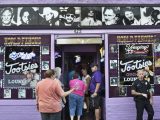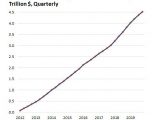Starbucks Employees Are Begging the Company to Shut Down Stores Because of Coronavirus: ‘Coffee Is Not Essential’
March 19, 2020Want the best of VICE News straight to your inbox? Sign up here.
Starbucks employees are pleading with executives of the $66 billion coffee juggernaut to immediately close thousands of its stores in an effort to avoid sickening employees and customers.
Several baristas, supervisors, and store managers who spoke to VICE News said that although the company has increased sanitation measures and moved to a “to go” model, employees feel they’re putting themselves at risk of contracting COVID-19 whenever they have to tell customers not to reach behind the counters, stay in the store, or crowd around each other. Plus, whenever an individual store closes to a high level of foot-traffic or illness, an employee's best option is often to transfer to another store that’s still operating so they can continue to get paid.
“Coffee is not essential at all. Starbucks is not essential,” Philadelphia barista Anyia Johnson told VICE News. She wrote a fast-growing petition to close all Starbucks locations that’s gathered more than 17,000 signatures from the company’s staff and customers in the past four days alone.
“And yet we’re still open,” she added.
Johnson believes it’s in both the customers’ and employees’ best interests to shut down entirely — rather than operate at reduced capacity, or with limited interaction. Part of the petition also includes a plea to extend paid leave to all employees while stores are closed. Johnson isn’t working right now because she got what the company calls “catastrophe pay” for being immunocompromised but feels more needs to be done for her fellow “partners” — or what Starbucks calls its employees.
“Pretty much, the company is exposing their workers to unsafe conditions while everyone above a certain pay grade is protected.”
The catastrophe pay — two week’s worth of money if an employee or a loved one are diagnosed or exposed to COVID-19, or if they’re immunocompromised — isn’t nearly enough to stem their rampant concerns about getting sick, employees told VICE News. And the money is limited since it’s often contingent on a coronavirus diagnosis that’s now notoriously hard to come by. (In some circumstances, catastrophe pay can be extended up to 26 weeks, according to the company.)
Starbucks did not immediately respond to a request for comment about whether or not it will close all stores and directed VICE News to statements the company’s already released.
Headquartered in Seattle, where the U.S. coronavirus outbreak began in earnest, Starbucks recently transitioned all of its stores to a “to-go” model to cope with the contagious respiratory illness. That means customers can still buy coffee and baked goods via select stores’ drive-thrus, or come into the cafe and order at the counter without lingering, in an effort to practice social distancing. The company has also introduced intensive cleaning measures at stores.
But some locations were actually busier than usual at the beginning of March, when cases started to climb across the U.S., according to Bloomberg News, though Johnson said business has since slowed down considerably.
“We need to shut it down if things are as serious as everybody is saying,” said one longtime Starbucks employee in Westchester, New York, who asked to remain anonymous because they feared employment repercussions. “At least for the next two weeks. And then after two weeks, I’d prefer to have the ability to file for unemployment.”
In areas dense with COVID-19 cases — Seattle and New York, according to a company memo — Starbucks’ stores are either operating at reduced hours or temporarily closed to the public.
“As we navigate COVID-19 together, what matters most is how we, as a company, care for you,” a company executives said in a letter to employees posted online. “I want you to know that here at Starbucks, you should never have to choose between work and taking care of yourself.
But employees at the existing closed stores are often transferred to other still-operating locations so they can keep their jobs, and the “to-go” model doesn’t really change too much about their interactions with customers, employees said. They feel they’re choosing between work and health daily.
One 30-year-old supervisor at a high-volume Starbucks in the Bay Area said she was suddenly transferred to another nearby location when hers closed. But when the Bay Area became the first U.S. area to order its residents to “shelter-in-place,” she said that Starbucks location was left open because it was deemed “essential” to residents. Instead, she’s clocking into work as usual, while salaried employees at other companies in the area stay home.
“Our store managers had a conference call this Monday with the district and regional managers who called into the meeting from their HOUSES!” the employee, who asked to remain anonymous, wrote in an email to VICE News. “Starbucks headquarters workers in Seattle are also working at home since Monday. Pretty much, the company is exposing their workers to unsafe conditions while everyone above a certain pay grade is protected.”
Other employees told VICE News they’re still working long hours. Some say customers have coughed on them in the store or reached behind the counter to grab items stores are trying to keep out of reach, like straws and takeout orders. A few emailed VICE News photos of crowded stores.
All the while, executives held the Starbucks’ annual shareholder meeting virtually, further confusing and frustrating employees at a company that’s otherwise known for offering progressive perks.
Employees also say the company has communicated their benefits to them in a lackluster way. For example, employees said Starbucks told them they’re able to add sick pay, vacation pay, and any other paid time off to their catastrophe pay. For many employees, according to the Westchester “partner,” those benefits aren’t much. She’s worked for the company for more than four years and has already used up her allotted sick “hours” this year and has less than half a week’s worth of vacation time.
They’re also not certain under which circumstances they’d qualify for unemployment benefits either. The Westchester partner noted that their boyfriend, who works for a smaller restaurant, has received help from his boss in filing for unemployment.
“There’s no solid choice for anyone — it’s go to work and miss pay. And a lot of people can’t afford to miss pay because they have children, elderly loved ones, or just bills,” Johnson said.
Cover: Customers wait for their order in their car at a Starbucks in Northbrook, Ill., Monday, March 16, 2020. Starbucks announced Sunday its company-owned stores across the U.S and Canada will shift to a "to go" model for at least two weeks to encourage social distancing. (AP Photo/Nam Y. Huh)


